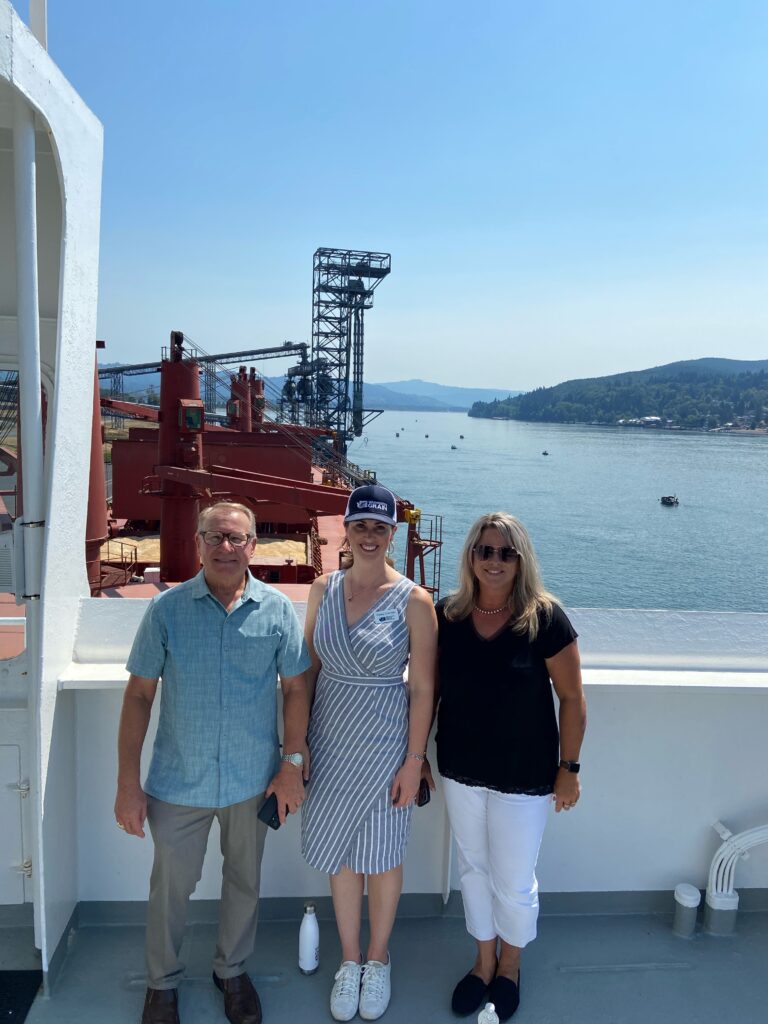The U.S. Food for Peace program: a lifeline of global nourishment
August 15, 2023
The Washington Grain Commission and the Washington Association of Wheat Growers joined a coalition of American agricultural producers, mariners and longshoremen, and state and federal officials on August 15 to raise awareness of the importance of maintaining American agricultural diplomacy around the world. The event showcased the departure of a U.S. Food for Peace shipment of American-grown soft white wheat aboard the U.S.-flag vessel Liberty Glory from the Port of Longview in Washington.
“It is an honor to celebrate a program that embodies compassion and collaboration—the U.S. Food for Peace program. Washington farmers understand the role that agriculture plays in ensuring global food security. Washington wheat, known for its exceptional quality, finds purpose beyond our borders nourishing the world and fostering prosperity at home. Wheat for food aid shipments is purchased off the commercial market, making it a win/win for our farmers and those receiving it. By participating in this program, we not only secure markets for our produce but also take immense pride in knowing that our grains are part of the solution to global hunger,” said Casey Chumrau, chief executive officer for the Washington Grain Commission.
The vessel is bound for delivery to the Middle East to alleviate hunger emergencies in the region.

“It is with great pride that we acknowledge the role Washington wheat farmers have played in the success of the U.S. Food for Peace program. As we gather to celebrate this program’s remarkable achievements, we must also acknowledge that the challenges of global food security persist. The impact of Food for Peace extends far beyond the immediate relief it provides. It fosters resilience, empowers communities, and uplifts societies. By continuing to invest in this program, we pave the way for a brighter, more secure future, and we maintain the bonds of goodwill and cooperation that strengthen our global community. It is essential that we also look forward and consider the importance of continuing this legacy into the future,” said Michelle Hennings, executive director of the Washington Association of Wheat Growers.
“We are honored for the opportunity to come together to commemorate the Food for Peace program and promote wheat as a nutritious component of international food aid. Thank you to all the remarkable individuals and partners who make these shipments possible,” Hennings said.
The event was hosted by Liberty Maritime, U.S. Wheat Associates, North American Millers Association, American Maritime Congress, Transportation Institute, Seafarers International Union, American Maritime Officers, the International Organization of Masters, Mate & Pilots, Marine Engineers’ Beneficial Association, the International Longshore and Warehouse Union and other federal, state, and local stakeholders. The Washington Grain Commission is a member of U.S. Wheat Associates.
###
The Washington Grain Commission (WGC) was created in 1958 by the Washington State Department of Agriculture with the support of Eastern Washington farmers. Barley came under the auspices of the organization in 2009. Our mission is to enhance the long-term profitability and competitiveness of Washington small grains and small grain producers through research, marketing and education. The current commission board is made up of seven farmer members, two industry representatives and a representative of the state’s Department of Agriculture. For more information, visit wagrains.org.
About WAWG: Education and outreach are the heart of Washington Association of Wheat Growers activity, all of which is aimed at helping Washington wheat families. Since 1954, WAWG has been dedicated to the enrichment of the Washington wheat industry as a nonprofit trade association, which depends on volunteers, membership dues and donations to carry out activities as representatives on the state and national levels. WAWG monitors state, transportation, research and natural resources policy and partners with the National Association of Wheat Growers to monitor national farm policy. Visit wawg.org for more information.
